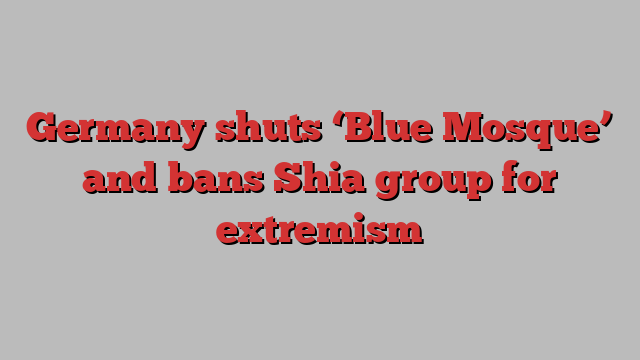
Unlock the Editor’s Digest for free
Roula Khalaf, Editor of the FT, selects her favourite stories in this weekly newsletter.
Germany has shut down one of the country’s largest and oldest mosques and ordered a ban on the nationwide Shia Muslim organisation that runs it for religious extremism.
Dozens of police raided Hamburg’s Blue Mosque on Wednesday morning, as well as 53 other properties across Germany, in one of the most significant crackdowns on political Islamism in the country in years.
The interior ministry said it was formally banning the Islamic Centre of Hamburg and its affiliated organisations for preaching “totalitarian rule, aggressive antisemitism and support for the terror group Hizbollah”.
Three other mosques, in Berlin, Frankfurt and Munich, have also been raided and closed.
“The [ICH] propagates an Islamist, totalitarian ideology in Germany,” said interior minister Nancy Faeser. “This Islamist ideology is directed against human dignity, against women’s rights, against an independent judiciary and against our democratic state.
“It is very important to me to make a clear distinction: we are not acting against a religion. We clearly differentiate between Islamists, against whom we take tough action, and the many Muslims who belong to our country and live their faith.”
Iran’s foreign ministry summoned the German ambassador to Tehran to “condemn the hostile action” and warned about “the consequences of such destructive actions,” which they said “exemplify a clear case of Islamophobia,” according to the official news agency, IRNA.
Iran conveyed to Germany that the measure could “incite religious and sectarian tensions”, the ministry added.
The ICH, which did not respond to a request for comment, has previously denied accusations of extremism.
It was one of the most prominent Shia organisations in Germany, and a founding member of the Central Council of Muslims in Germany.
But the group has come under mounting scrutiny in recent years, with growing calls for it to be shut down as a result of its hardline religious doctrine and links to extremist groups outside Germany.
The Blue Mosque itself has been monitored on and off by German domestic intelligence since 1993, and in 2017 was formally designated by security authorities to be an “instrument” of the Iranian regime.
The attack by Hamas on Israel in October last year has prompted a zero-tolerance clampdown by the German government, which has been at pains to assert its support for Israel and Jewish life in Germany and rebut criticism that it has been idle in tackling domestic religious extremism.
Investigations into the ICH began last November when police searched ICH properties and confiscated evidence.
Intelligence agencies and police concluded the organisation was “extremely conspiratorial” and had carefully worked to craft a false image of tolerance while working “intensively and steadfastly” in secret to promote an “Islamic revolution” in Germany, the interior ministry said.
Tensions between security authorities and many German Muslim groups remain high amid a marked uptick in antisemitic hate crimes across the country.
Antisemitic incidents rose 83 per cent in 2023, according to the government’s independent commissioner.
But Berlin has also come under fire for adopting a heavy-handed approach to policing opinion around the war in Gaza, and sometimes failing to fairly distinguish between legitimate criticism of Israeli government policy and racial hatred.
Sabine Döring, Germany’s junior minister for higher education, was forced to resign last month after her ministry started exploring legal options to defund the research of German academics who had signed a public letter criticising a police crackdown on anti-Israeli student protests.
Additional reporting by Najmeh Bozorgmehr

